国际贸易实务英文版课后练习参考答案解析
国际贸易实务英语课后练习答案

Unit oneI. Find in the text the English equivalents for the following:protectionism domestic marketinterference direct investmentrestriction be first voiced bydominate mercantilismconsume outflow of currencycurrency portfolio investmentII. Fill in the blanks with proper English terms:1) Merchandise exports2) Service exports and imports3) Merchandise imports4) International trade5) Direct investment (FDI)6) Portfolio investmentIII. Choose a suitable word for each of the blanks in the following paragraph:trade; liberalization; facilitate; competition; increasinglyV. (P10) Translate the following paragraph into Chinese:一个国家出现贸易盈余或贸易顺差,是指该国当前进口货物和服务的价值小于出口货物和服务的价值。
在重商主义时期,这一差值通过转移黄金弥补,但是在今天是通过持有贸易赤字国家的货币或以该国货币表示的投资来弥补。
实质上,盈余国家在给予赤字国家信贷。
如果此种信贷最终不能买回足够的货物和服务,所谓的贸易顺差结果实际上可能对盈余国家不利。
I.Give the Chinese equivalents for the following English terms:1) 绝对优势理论 2)比较优势理论 3)国际劳动分工 4)要素禀赋理论 5)土地密集型产品 6)劳动密集型产品 7)资本密集新产品 8)获得优势 9)天然优势 10)文化要素差异II. (p18-19) Translate the following sentences into Chinese according to the patterns:1.即使所有产品都具有绝对优势的国家,因其必须放弃产出效率低的产品转而生产产出效率高的产品,也会从贸易中获益。
国际贸易实务英文版课后练习参考答案 (2)
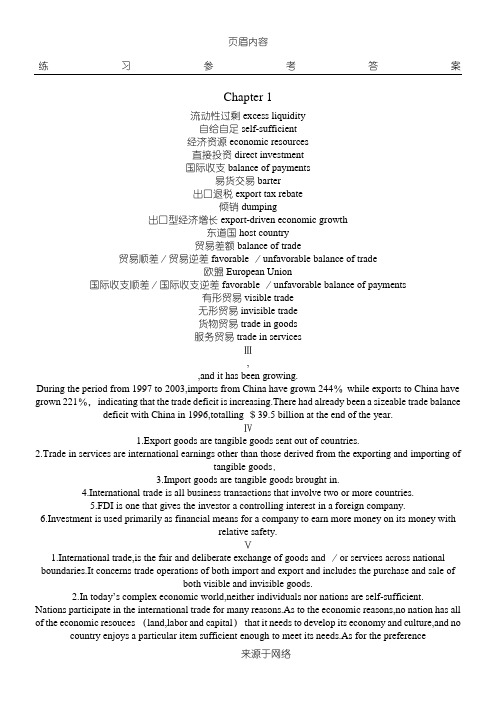
练习参考答案Chapter 1流动性过剩excess liquidity自给自足self-sufficient经济资源economic resources直接投资direct investment国际收支balance of payments易货交易barter6.Investment is used primarily as financial means for a company to earn more money on its money withrelative safety.Ⅴ1.International trade,is the fair and deliberate exchange of goods and /or services across national boundaries.It concerns trade operations of both import and export and includes the purchase and sale ofboth visible and invisible goods.2.In today’s complex economic world,neither individuals nor nations are self-sufficient. Nations participate in the international trade for many reasons.As to the economic reasons,no nation has all of the economic resouces (land,labor and capital)that it needs to develop its economy and culture,and no country enjoys a particular item sufficient enough to meet its needs.As for the preferencereasons,international trade takes place because of innovation of style.Besides,every nation can specialize in a certain field and enjoy a comparative advantage in some particular area in terms of trade so that they needto do business with each other to make use of resources more efficiently and effectively.3.In measuring the effectiveness of global trade,nations carefully follow two key indicators,namely,balanceof trade and balance of payments.4.FDI,the abbreviation form Foreign Direct Investment,means buying of permanentproperty and business in foreign nations.It occurs when acquisition of equity interest in a foreign company is made.The great significance of FDI for China might be that:FDI solve the problem of capital shortage for China so that China may spend the money on importing advanced equipment and technologies for its infrastructure,national supporting industry,key projects,etc.“Buy local”rules 本地采购原则Ⅱ1.Protectionism means the deliberate use or encouragement of restrictions on imports to enable relativelyinefficient domestic producers to compete successfully with foreign producers.保护主义是指蓄意使用或鼓励进口限制,以此使本国相对效率低的产品能成功地和外国产品竞争。
国际贸易实务英文版第二版课后习题答案
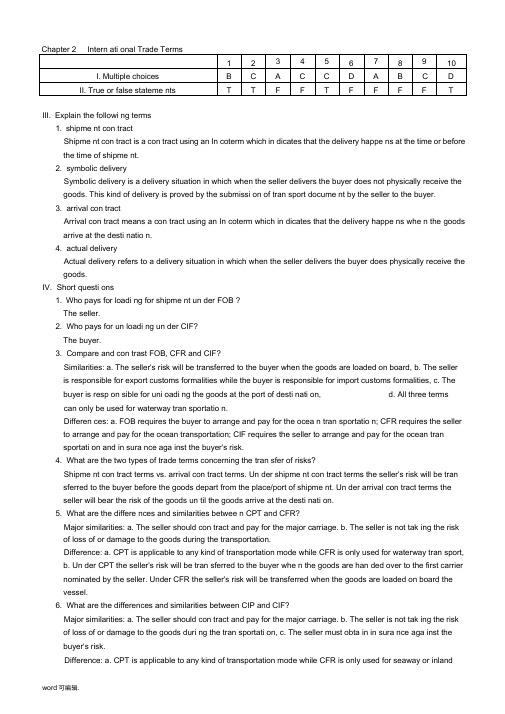
III. Explain the followi ng terms1. shipme nt con tractShipme nt con tract is a con tract using an In coterm which in dicates that the delivery happe ns at the time or before the time of shipme nt.2. symbolic deliverySymbolic delivery is a delivery situation in which when the seller delivers the buyer does not physically receive the goods. This kind of delivery is proved by the submissi on of tran sport docume nt by the seller to the buyer.3. arrival con tractArrival con tract means a con tract using an In coterm which in dicates that the delivery happe ns whe n the goods arrive at the desti natio n.4. actual deliveryActual delivery refers to a delivery situation in which when the seller delivers the buyer does physically receive the goods.IV. Short questi ons1. Who pays for loadi ng for shipme nt un der FOB ?The seller.2. Who pays for un loadi ng un der CIF?The buyer.3. Compare and con trast FOB, CFR and CIF?Similarities: a. The seller's risk will be transferred to the buyer when the goods are loaded on board, b. The seller is responsible for export customs formalities while the buyer is responsible for import customs formalities, c. The buyer is resp on sible for uni oadi ng the goods at the port of desti nati on, d. All three terms can only be used for waterway tran sportatio n.Differen ces: a. FOB requires the buyer to arrange and pay for the ocea n tran sportatio n; CFR requires the seller to arrange and pay for the ocean transportation; CIF requires the seller to arrange and pay for the ocean transportati on and in sura nce aga inst the buyer's risk.4. What are the two types of trade terms concerning the tran sfer of risks?Shipme nt con tract terms vs. arrival con tract terms. Un der shipme nt con tract terms the seller's risk will be tran sferred to the buyer before the goods depart from the place/port of shipme nt. Un der arrival con tract terms the seller will bear the risk of the goods un til the goods arrive at the desti nati on.5. What are the differe nces and similarities betwee n CPT and CFR?Major similarities: a. The seller should con tract and pay for the major carriage. b. The seller is not tak ing the risk of loss of or damage to the goods during the transportation.Difference: a. CPT is applicable to any kind of transportation mode while CFR is only used for waterway tran sport,b. Un der CPT the seller's risk will be tran sferred to the buyer whe n the goods are han ded over to the first carriernominated by the seller. Under CFR the seller's risk will be transferred when the goods are loaded on board the vessel.6. What are the differences and similarities between CIP and CIF?Major similarities: a. The seller should con tract and pay for the major carriage. b. The seller is not tak ing the risk of loss of or damage to the goods duri ng the tran sportati on, c. The seller must obta in in sura nce aga inst the buyer's risk.Difference: a. CPT is applicable to any kind of transportation mode while CFR is only used for seaway or inlandwaterway tran sport, b. Un der CPT the seller's risk will be tran sferred to the buyer whe n the goods are han ded over to the first carrier nomin ated by the seller. Un der CFR the seller's risk will be tran sferred whe n the goods are loaded on board the vessel.7. If you trade with an America n, is the sales con tract subject to In coterms without any doubt? What should youdo?No. The Revised American Foreign Trade Definitions 1941 is still in use, especially in the North American area. It has different interpretation about some trade terms. The traders should clarify the choice of rules before anyfurther discussi on.8. What are the most com monly used trade terms?FOB, CFR & CIF.9. Who is resp on sible for carry ing out customs formalities for exports un der an FOB con tract?The seller. Accord ing to In coterms 2010, except EXW and DDP these two terms, all the other eleve n termsrequire the seller to han dle the export customs formalities, while the buyer the import customs formalities.10. If a Chin ese trader sig ns an FOB Hamburg con tract, is he export ing or import ing?Import ing. FOB should be used with a "n amed port of shipme nt", if Hamburg is the port of shipme nt, from the Chin ese trader's perspective, he is import ing.V. Case studies1. An FOB con tract stipulated "The shipme nt will be effected in March 2011." When the goods were ready on 10March 201 l, the seller con tacted the buyer for shipme nt details. The buyer faxed "Please send the goods to the port for loading on 21 March. The vessel will depart on 22 March." The seller sent the goods to the port accord in gly. However the nomin ated vessel did not turn up and the goods had to be stored in the warehouse at the port.On the ni ght of 21 March a fire happe ned in the warehouse area and part of the goods was damaged. When the vessel arrived two days later the seller and the buyer had an argument about the settlement of the loss. The seller required the buyer to bear the loss caused by the fire, but the buyer believed that the vessel arrived within the shipme nt period and the loss occurred before the seller delivered the goods therefore the seller should bear the loss. Please provide your soluti on.析:1)首先案例中提到货物发生了损失是由于货物存放在码头仓库期间发生火灾造成的。
(完整版)国际贸易实务英文版第二版课后习题答案
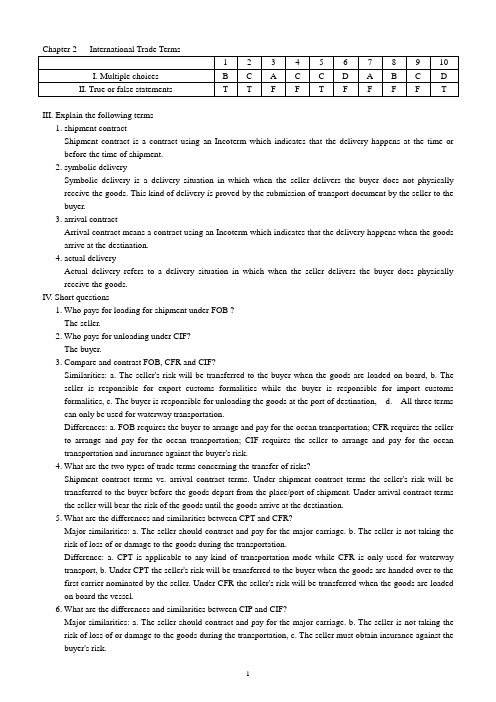
III. Explain the following terms1. shipment contractShipment contract is a contract using an Incoterm which indicates that the delivery happens at the time or before the time of shipment.2. symbolic deliverySymbolic delivery is a delivery situation in which when the seller delivers the buyer does not physically receive the goods. This kind of delivery is proved by the submission of transport document by the seller to the buyer.3. arrival contractArrival contract means a contract using an Incoterm which indicates that the delivery happens when the goods arrive at the destination.4. actual deliveryActual delivery refers to a delivery situation in which when the seller delivers the buyer does physically receive the goods.IV. Short questions1. Who pays for loading for shipment under FOB ?The seller.2. Who pays for unloading under CIF?The buyer.3. Compare and contrast FOB, CFR and CIF?Similarities: a. The seller's risk will be transferred to the buyer when the goods are loaded on board, b. The seller is responsible for export customs formalities while the buyer is responsible for import customs formalities, c. The buyer is responsible for unloading the goods at the port of destination, d. All three terms can only be used for waterway transportation.Differences: a. FOB requires the buyer to arrange and pay for the ocean transportation; CFR requires the seller to arrange and pay for the ocean transportation; CIF requires the seller to arrange and pay for the ocean transportation and insurance against the buyer's risk.4. What are the two types of trade terms concerning the transfer of risks?Shipment contract terms vs. arrival contract terms. Under shipment contract terms the seller's risk will be transferred to the buyer before the goods depart from the place/port of shipment. Under arrival contract terms the seller will bear the risk of the goods until the goods arrive at the destination.5. What are the differences and similarities between CPT and CFR?Major similarities: a. The seller should contract and pay for the major carriage. b. The seller is not taking the risk of loss of or damage to the goods during the transportation.Difference: a. CPT is applicable to any kind of transportation mode while CFR is only used for waterway transport, b. Under CPT the seller's risk will be transferred to the buyer when the goods are handed over to the first carrier nominated by the seller. Under CFR the seller's risk will be transferred when the goods are loaded on board the vessel.6. What are the differences and similarities between CIP and CIF?Major similarities: a. The seller should contract and pay for the major carriage. b. The seller is not taking the risk of loss of or damage to the goods during the transportation, c. The seller must obtain insurance against the buyer's risk.Difference: a. CPT is applicable to any kind of transportation mode while CFR is only used for seaway or inland waterway transport, b. Under CPT the seller's risk will be transferred to the buyer when the goods are handed over to the first carrier nominated by the seller. Under CFR the seller's risk will be transferred when the goods are loaded on board the vessel.7. If you trade with an American, is the sales contract subject to Incoterms without any doubt? What should youdo?No. The Revised American Foreign Trade Definitions 1941 is still in use, especially in the North American area. It has different interpretation about some trade terms. The traders should clarify the choice of rules before any further discussion.8. What are the most commonly used trade terms?FOB, CFR & CIF.9. Who is responsible for carrying out customs formalities for exports under an FOB contract?The seller. According to Incoterms 2010, except EXW and DDP these two terms, all the other eleven terms require the seller to handle the export customs formalities, while the buyer the import customs formalities.10. If a Chinese trader signs an FOB Hamburg contract, is he exporting or importing?Importing. FOB should be used with a "named port of shipment", if Hamburg is the port of shipment, from the Chinese trader's perspective, he is importing.V. Case studies1. An FOB contract stipulated "The shipment will be effected in March 2011." When the goods were ready on 10March 201 l, the seller contacted the buyer for shipment details. The buyer faxed "Please send the goods to the port for loading on 21 March. The vessel will depart on 22 March." The seller sent the goods to the port accordingly. However the nominated vessel did not turn up and the goods had to be stored in the warehouse at the port. On the night of 21 March a fire happened in the warehouse area and part of the goods was damaged.When the vessel arrived two days later the seller and the buyer had an argument about the settlement of the loss. The seller required the buyer to bear the loss caused by the fire, but the buyer believed that the vessel arrived within the shipment period and the loss occurred before the seller delivered the goods therefore the seller should bear the loss. Please provide your solution.析:1)首先案例中提到货物发生了损失是由于货物存放在码头仓库期间发生火灾造成的。
(完整版)国际贸易实务(周瑞琪等)_课后答案详解
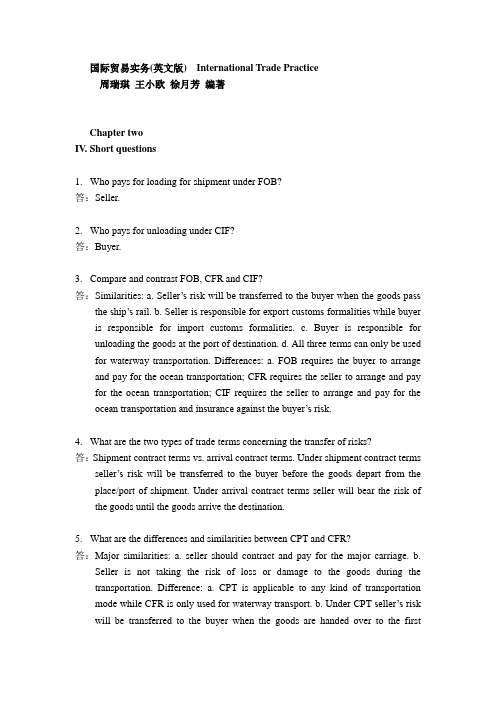
国际贸易实务(英文版) International Trade Practice周瑞琪王小欧徐月芳编著Chapter twoIV. Short questions1.Who pays for loading for shipment under FOB?答:Seller.2.Who pays for unloading under CIF?答:Buyer.pare and contrast FOB, CFR and CIF?答:Similarities: a. Sel ler’s risk will be transferred to the buyer when the goods pass the ship’s rail. b. Seller is responsible for export customs formalities while buyer is responsible for import customs formalities. c. Buyer is responsible for unloading the goods at the port of destination. d. All three terms can only be used for waterway transportation. Differences: a. FOB requires the buyer to arrange and pay for the ocean transportation; CFR requires the seller to arrange and pay for the ocean transportation; CIF requires the seller to arrange and pay for the ocean transportation and insurance against the buyer’s risk.4.What are the two types of trade terms concerning the transfer of risks?答:Shipment contract terms vs. arrival contract terms. Under shipment contract terms s eller’s risk will be transferred to the buyer before the goods depart from the place/port of shipment. Under arrival contract terms seller will bear the risk of the goods until the goods arrive the destination.5.What are the differences and similarities between CPT and CFR?答:Major similarities: a. seller should contract and pay for the major carriage. b.Seller is not taking the risk of loss or damage to the goods during the transportation. Difference: a. CPT is applicable to any kind of transportation mode while CFR is only used for waterway transport. b. Under CPT seller’s risk will be transferred to the buyer when the goods are handed over to the firstcarrier nominated by seller. Under CFR seller’s risk will be transferred when the goods pass over the ship’s rail.6.What are the differences and similarities between CIP and CIF?答:Major similarities: a. seller should contract and pay for the major carriage. b.Seller is not taking the risk of loss or damage to the goods during the transportation. c. Seller must obtain insurance against buyer’s risk. Difference: a.CPT is applicable to any kind of transportation mode while CFR is only used for waterway transport. b. Under CPT seller’s risk will be transferred to the buyer when the goods are handed over to the first carrier nominated by seller. Under CFR seller’s risk will be transferred when the goods pass over the ship’s rail.7.If you trade with an American, is the sales contract subject to Incoterms withoutany doubt? What should you do?答:No. The Revised American Foreign Trade Definitions 1941 is still in use, especially among the North American area. It has different interpretation about some trade terms. The traders should clarify the choice of rules before any further discussion.8.What are the most commonly used trade terms?答:FOB,CFR & CIF.9.Who is responsible for carrying out customs formalities for exports under an FOBcontract?答:Seller. According to Incoterms 2000, except EXW and DDP these two terms, all the other eleven terms require the seller to handle the export customs formalities, while buyer the import customs formalities.10.If a Chinese trader signs a FOB Hamburg contract, is he exporting or importing? 答:Importing. FOB should be used with a “named port of shipment”, if Hamb urg is the port of shipment, from the Chinese trader’s perspective, he is importing.V.Case Studies1. An FOB contract stipulated, "The shipment will be effected in March 2008. If thevessel fails to arrive at the port of shipment on time, the seller agrees to set aside the goods for additional 27 days, and the buyer will bear all costs of delay." it turned out that under the seller's repeated requests, the vessel named by the buyer finally arrived at the port of shipment on May 1. As a result, the seller refused to make the shipment.(1)Was the seller entitled to compensation for the warehouse rent, insurance andinterest due to the delay?(2)If the seller had sold the goods to a third party on April 25, should the buyerpay for the delay?(3)If the seller had sold the goods to a third party on May 1 with a better price,was he entitled to any compensation?析:a案例中提到“shipment will be effected in March 2008”,这种确定装运时间的方式允许在整个3月份期间的任何时间进行装运。
国际贸易实务英文版课后练习参考答案
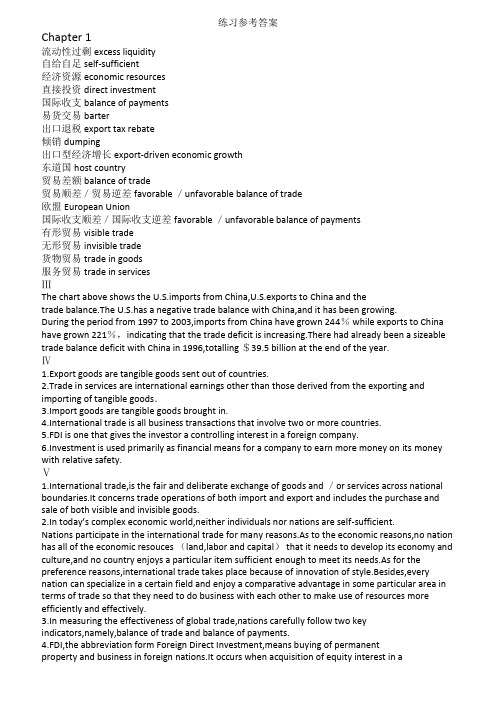
保护性关税表示对进口产品征收的关税,旨在让它们相比起本国商品更贵,从而使得本国商品具有价格优势。
4.Types of tariffs include ad valorem,specific,variable,or compound.In the United
States,the imposition of tariffs is made on imported goods only.Tariffs raise the prices ofimported goods,thus making them less competitive within the market of the importingcountry.After seven”Rounds”of General Agreement on Tariffs and Trade tradenegotiations that focused heavily on tariff reductions,tariffs are less important measures ofprotection than they used to be.
property and business in foreign nations.It occurs when acquisition of equity interest in a
国际贸易实务英语课后练习答案

U n i t o n eI. Find in the text the English equivalents for the following:protectionism domestic marketinterference direct investmentrestriction be first voiced bydominate mercantilism不利。
I.Give the Chinese equivalents for the following English terms:1) 绝对优势理论2)比较优势理论3)国际劳动分工4)要素禀赋理论5)土地密集型产品6)劳动密集型产品7)资本密集新产品8)获得优势9)天然优势10)文化要素差异II. (p18-19) Translate the following sentences into Chinese according to the patterns:1.即使所有产品都具有绝对优势的国家,因其必须放弃产出效率低的产品转而生产产出效率高的产品,也会从贸易中获益。
2.尽管美国产茶与产麦均有绝对优势,可它只在麦子生产上具有相对优势,因其产麦的优势较其产茶的优势更大。
3.要素禀赋理论认为,较丰富的生产要素比相对稀缺的要素更加廉价。
4.为了做好国际贸易,公司经理除需要掌握业务经营知识,还需要掌握基本的社会科学知识。
Unit TwoII.retaliatory tariff retail pricecountervailing tariff wholesale pricepunitive tax licenseSpecial Drawing Right clandestinerevenue tariff non-tariff barriersgovernment procurement coordinationinfant industry customs valuationII. (p36) Translate the following into Chinese:大多数国家目前就估价的程序达成了一致。
英文版国际贸易实务2-7答案---精品管理资料

国际贸易实务(英文版) International Trade Practice周瑞琪王小欧徐月芳编著Chapter twoIV. Short questions1. Who pays for loading for shipment under FOB?答:Seller.2. Who pays for unloading under CIF?答:Buyer。
3. Compare and contrast FOB,CFR and CIF?答:Similarities: a。
Seller's risk will be transferred to the buyer when the goods passthe ship's rail. b。
Seller is responsible for export customs formalities while buyer is responsible for import customs formalities. c. Buyer is responsible for unloading the goods at the port of destination. d. All three terms can only be used for waterway transportation. Differences:a. FOB requires the buyer to arrange and pay for the ocean transportation; CFR requires the seller to arrange and pay for the ocean transportation; CIF requires t he seller to arrange and pay for the ocean transportation and insurance against the buyer’s risk.4. What are the two types of trade terms concerning the transfer of risks?答:Shipment contract terms vs。
国际贸易实务英文版第二版课后习题答案

III. Explain the following terms1. shipment contractShipment contract is a contract using an Incoterm which indicates that the delivery happens at the time or before the time of shipment.2. symbolic deliverySymbolic delivery is a delivery situation in which when the seller delivers the buyer does not physically receive the goods. This kind of delivery is proved by the submission of transport document by the seller to the buyer.3. arrival contractArrival contract means a contract using an Incoterm which indicates that the delivery happens when the goods arrive at the destination.4. actual deliveryActual delivery refers to a delivery situation in which when the seller delivers the buyer does physically receive the goods.IV. Short questions1. Who pays for loading for shipment under FOB ?The seller.2. Who pays for unloading under CIF?The buyer.3. Compare and contrast FOB, CFR and CIF?Similarities: a. The seller's risk will be transferred to the buyer when the goods are loaded on board, b. The seller is responsible for export customs formalities while the buyer is responsible for import customs formalities, c. The buyer is responsible for unloading the goods at the port of destination, d. All three terms can only be used for waterway transportation.Differences: a. FOB requires the buyer to arrange and pay for the ocean transportation; CFR requires the seller to arrange and pay for the ocean transportation; CIF requires the seller to arrange and pay for the ocean transportation and insurance against the buyer's risk.4. What are the two types of trade terms concerning the transfer of risks?Shipment contract terms vs. arrival contract terms. Under shipment contract terms the seller's risk will be transferred to the buyer before the goods depart from the place/port of shipment. Under arrival contract terms the seller will bear the risk of the goods until the goods arrive at the destination.5. What are the differences and similarities between CPT and CFR?Major similarities: a. The seller should contract and pay for the major carriage. b. The seller is not taking the risk of loss of or damage to the goods during the transportation.Difference: a. CPT is applicable to any kind of transportation mode while CFR is only used for waterway transport, b. Under CPT the seller's risk will be transferred to the buyer when the goods are handed over to the first carrier nominated by the seller. Under CFR the seller's risk will be transferred when the goods are loaded on board the vessel.6. What are the differences and similarities between CIP and CIF?Major similarities: a. The seller should contract and pay for the major carriage. b. The seller is not taking the risk of loss of or damage to the goods during the transportation, c. The seller must obtain insurance against the buyer's risk.Difference: a. CPT is applicable to any kind of transportation mode while CFR is only used for seaway or inland waterway transport, b. Under CPT the seller's risk will be transferred to the buyer when the goods are handed over to the first carrier nominated by the seller. Under CFR the seller's risk will be transferred when the goods are loaded on board the vessel.7. If you trade with an American, is the sales contract subject to Incoterms without any doubt? What should youdo?No. The Revised American Foreign Trade Definitions 1941 is still in use, especially in the North American area. It has different interpretation about some trade terms. The traders should clarify the choice of rules before any further discussion.8. What are the most commonly used trade terms?FOB, CFR & CIF.9. Who is responsible for carrying out customs formalities for exports under an FOB contract?The seller. According to Incoterms 2010, except EXW and DDP these two terms, all the other eleven terms require the seller to handle the export customs formalities, while the buyer the import customs formalities.10. If a Chinese trader signs an FOB Hamburg contract, is he exporting or importing?Importing. FOB should be used with a "named port of shipment", if Hamburg is the port of shipment, from the Chinese trader's perspective, he is importing.V. Case studies1. An FOB contract stipulated "The shipment will be effected in March 2011." When the goods were ready on 10March 201 l, the seller contacted the buyer for shipment details. The buyer faxed "Please send the goods to the port for loading on 21 March. The vessel will depart on 22 March." The seller sent the goods to the port accordingly. However the nominated vessel did not turn up and the goods had to be stored in the warehouse at the port. On the night of 21 March a fire happened in the warehouse area and part of the goods was damaged.When the vessel arrived two days later the seller and the buyer had an argument about the settlement of the loss. The seller required the buyer to bear the loss caused by the fire, but the buyer believed that the vessel arrived within the shipment period and the loss occurred before the seller delivered the goods therefore the seller should bear the loss. Please provide your solution.析:1)首先案例中提到货物发生了损失是由于货物存放在码头仓库期间发生火灾造成的。
国际贸易实务课后练习答案英文版

What contents shoul d a contract embody?Sell er's and buyer's name.The name of commodity and unit price.Terms of d elivery.Payment terms.Delivery date.Insurance.Claim clause.Arbitration clause。
Force majeure clause.mImport license.mAmendments and suppl ements.Supersed e contract.Retirement right.Place of signing.Plain language.Different date formats.Units of measurement.Currency.Interpretation or translation.Signing of the contract.ually terms of trad e are stipulated in the trad e contract and cl early indicateboth parties responsibilities.√2.Claim and arbitration clause must be includ ed in the written contract.×3.Once signed, I need amendments and suppl ements to the present contractcoul d not be accepted.╳4. A firm offer must indicate that once it has been an conditionally Accept bythe offered within its validity,The offer is binding on both parties.√5.Written form of contract has a l ot of advantages in disputes. Resolving soevery contract shoul d be conducted in writing.×6.In most cases both the buyer and the seller will experience many runs of offerand counter offer before. Concluding a contract.√7.According to cIsgI offer, if it is irrevocabl e, may not be withdrawn if thewithdrawal reaches the offeree being or at the same time as the offer.×8.According to crsg,There are firm offer and non firm offer.×9. A firm offer should includ e at l east three specific conditions, name ofcommodity, quality of commodity and price of commodity.√10.The content of the offer can be ind efinite.×11.In reality.the quantity of goods shipped must be exactly the same with thatstipulated in the contract.×12.In terms of systems of ways and measures. China ad opts us system due to isbeing wid ely applied in the international trad e.×13.Packing can only serve as a form of protection.×14.Graceful night is often stipulated in the contract to indicate that the way ofthe lies valued products is cal culated by Gross weight.√15.The more or l ess cl ouds means that the quantity d elivered can be more or l esswithin certain extent.√Yes, the articl es had great changes in price at the time when d elivery is mad e. The sail or may stipulate that settlement for this part is based on the market price at the time. When the goods I shipped on board the vessel.错。
国际贸易实务英文版课后练习题含答案
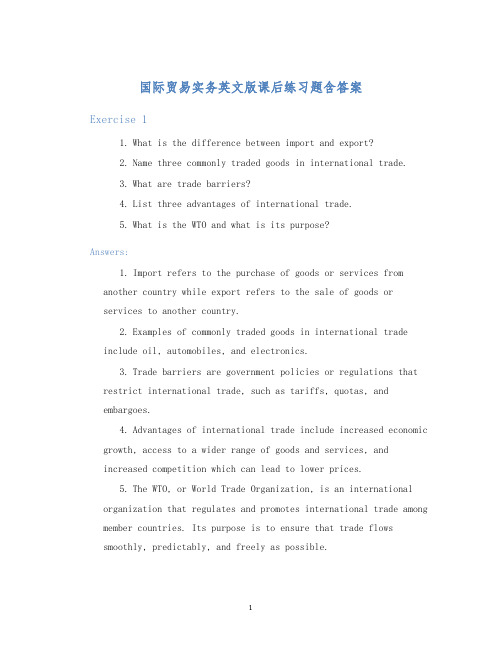
国际贸易实务英文版课后练习题含答案Exercise 11.What is the difference between import and export? three commonly traded goods in international trade.3.What are trade barriers?4.List three advantages of international trade.5.What is the WTO and what is its purpose?Answers:1.Import refers to the purchase of goods or services fromanother country while export refers to the sale of goods orservices to another country.2.Examples of commonly traded goods in international tradeinclude oil, automobiles, and electronics.3.Trade barriers are government policies or regulations thatrestrict international trade, such as tariffs, quotas, andembargoes.4.Advantages of international trade include increased economicgrowth, access to a wider range of goods and services, andincreased competition which can lead to lower prices.5.The WTO, or World Trade Organization, is an internationalorganization that regulates and promotes international trade among member countries. Its purpose is to ensure that trade flowssmoothly, predictably, and freely as possible.Exercise 21.What is the difference between an open economy and a closedeconomy?2.What is a balance of trade? three factors that can influence a country’s balanceof trade.4.What is a trade deficit?5.What are the consequences of a trade deficit?Answers:1.An open economy is one that engages in international tradeand allows foreign investment while a closed economy is one that does not engage in international trade or allow foreign investment.2.Balance of trade refers to the difference between acountry’s exports and its imports during a specific time period.3.Factors that can influence a country’s balance of tradeinclude political stability, currency exchange rates, and trade policies such as tariffs and subsidies.4.A trade deficit occ urs when a country’s imports exceed itsexports.5.The consequences of a trade deficit can include a decreasein a country’s currency value, increased borrowing from foreign countries, and a loss of jobs in the domestic economy.Exercise 31.What is the difference between absolute advantage andcomparative advantage?2.Give an example of a country that has an absolute advantagein producing a specific good.3.What is the basis for comparative advantage?4.Expln the concept of opportunity cost and how it relates tocomparative advantage.5.How can a country benefit from specializing in theproduction of goods in which it has a comparative advantage? Answers:1.Absolute advantage exists when a country can produce a goodmore efficiently than another country while comparative advantage exists when a country can produce a good at a lower opportunity cost than another country.2.For example, Saudi Arabia has an absolute advantage inproducing oil due to its abundance of natural resources andadvanced technology.3.The basis for comparative advantage is the idea thatcountries should specialize in producing goods in which they havea lower opportunity cost compared to other goods.4.Opportunity cost refers to the value of the next bestalternative that is given up in order to pursue a particularaction. It relates to comparative advantage because a countryshould produce the goods in which it has a comparative advantage and trade for goods in which it does not have a comparativeadvantage.5.A country can benefit from specializing in the production ofgoods in which it has a comparative advantage by increasingefficiency and productivity, leading to lower costs and increased competitiveness in international trade.。
国际贸易实务英文版课后练习参考答案

练习参考答案Chapter 1流动性过剩excess liquidity自给自足self-sufficient经济资源economic resources直接投资direct investment国际收支balance of payments易货交易barter出口退税export tax rebate倾销dumping出口型经济增长export-driven economic growth东道国host country贸易差额balance of trade贸易顺差/贸易逆差favorable /unfavorable balance of trade欧盟European Union国际收支顺差/国际收支逆差favorable /unfavorable balance of payments有形贸易visible trade无形贸易invisible trade货物贸易trade in goods服务贸易trade in servicesⅢDuring the period from 1997 to 2003,imports from China have grown 244%while exports to China have grown 221%,indicating that the trade deficit is increasing.There had already been a sizeable trade balance deficit with China in 1996,totalling $39.5 billion at the end of the year.Ⅳ1.Export goods are tangible goods sent out of countries.2.Trade in services are international earnings other than those derived from the exporting and importing of tangible goods.3.Import goods are tangible goods brought in.4.International trade is all business transactions that involve two or more countries.5.FDI is one that gives the investor a controlling interest in a foreign company.6.Investment is used primarily as financial means for a company to earn more money on its money with relative safety.Ⅴ1.International trade,is the fair and deliberate exchange of goods and /or services across national boundaries.It concerns trade operations of both import and export and includes the purchase and sale of both visible and invisible goods.2.In today’s complex economic world,neither individuals nor nations are self-sufficient.Nations participate in the international trade for many reasons.As to the economic reasons,no nation has all of the economic resouces (land,labor and capital)that it needs to develop its economy and culture,and no country enjoys a particular item sufficient enough to meet its needs.As for the preferencereasons,international trade takes place because of innovation of style.Besides,every nation can specialize in a certain field and enjoy a comparative advantage in some particular area in terms of trade so that they need to do business with each other to make use of resources more efficiently and effectively.3.In measuring the effectiveness of global trade,nations carefully follow two key indicators,namely,balance of trade and balance of payments.4.FDI,the abbreviation form Foreign Direct Investment,means buying of permanentproperty and business in foreign nations.It occurs when acquisition of equity interest in aforeign company is made.The great significance of FDI for China might be that:FDI solve the problem of capital shortage for China so that China may spend the money on importing advanced equipment and technologies for its infrastructure,national supporting industry,key projects,etc.Chapter 2关税壁垒tariff barriers非关税壁垒non-tariff barriers从量税specific duties配额quota保护性关税protective tariff市场失灵market failure幼稚产业infant industry许可证制度licensing system财政关税revenue tariff政府采购government procurement贸易保护主义trade protectionism从价税Ad valorem Duties最低限价floor price本地采购规则“buy local”rules增加内需raise domestic demandDomestic content 国内含量Red-tape barriers 进口环节壁垒Export susidies 出口补贴Binding quota 绑定配额Absolute quotas 绝对配额VER 自愿出口限制Tariff-rate quotas 关税配额Zero quota 零配额“Buy local”rules 本地采购原则Ⅱ1.Protectionism means the deliberate use or encouragement of restrictions on imports to enable relatively inefficient domestic producers to compete successfully with foreign producers.保护主义是指蓄意使用或鼓励进口限制,以此使本国相对效率低的产品能成功地和外国产品竞争。
国际贸易实务英文版课后练习参考答案解析
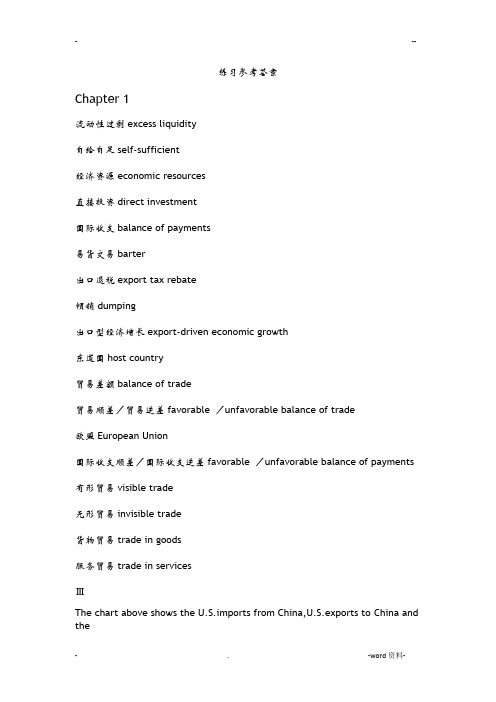
练习参考答案Chapter 1流动性过剩excess liquidity自给自足self-sufficient经济资源economic resources直接投资direct investment国际收支balance of payments易货交易barter出口退税export tax rebate倾销dumping出口型经济增长export-driven economic growth东道国host country贸易差额balance of trade贸易顺差/贸易逆差favorable /unfavorable balance of trade欧盟European Union国际收支顺差/国际收支逆差favorable /unfavorable balance of payments 有形贸易visible trade无形贸易invisible trade货物贸易trade in goods服务贸易trade in servicesⅢThe chart above shows the U.S.imports from China,U.S.exports to China and thetrade balance.The U.S.has a negative trade balance with China,and it has been growing.During the period from 1997 to 2003,imports from China have grown 244%while exports to China have grown 221%,indicating that the trade deficit is increasing.There had already been a sizeable trade balance deficit with China in 1996,totalling $39.5 billion at the end of the year.Ⅳ1.Export goods are tangible goods sent out of countries.2.Trade in services are international earnings other than those derived from the exporting and importing of tangible goods.3.Import goods are tangible goods brought in.4.International trade is all business transactions that involve two or more countries.5.FDI is one that gives the investor a controlling interest in a foreign company.6.Investment is used primarily as financial means for a company to earn more money on its money with relative safety.Ⅴ1.International trade,is the fair and deliberate exchange of goods and /or services across national boundaries.It concerns trade operations of both import and export and includes the purchase and sale of both visible and invisible goods.2.In today’s complex economic world,neither individuals nor nations areself-sufficient.Nations participate in the international trade for many reasons.As to the economic reasons,no nation has all of the economic resouces (land,labor andcapital)that it needs to develop its economy and culture,and no country enjoys a particular item sufficient enough to meet its needs.As for the preference reasons,international trade takes place because of innovation of style.Besides,every nation can specialize in a certain field and enjoy a comparative advantage in some particular area in terms of trade so that they need to do business with each other to make use of resources more efficiently and effectively.3.In measuring the effectiveness of global trade,nations carefully follow two key indicators,namely,balance of trade and balance of payments.4.FDI,the abbreviation form Foreign Direct Investment,means buying of permanentproperty and business in foreign nations.It occurs when acquisition of equity interest in aforeign company is made.The great significance of FDI for China might be that:FDI solve the problem of capital shortage for China so that China may spend the money on importing advanced equipment and technologies for its infrastructure,national supporting industry,key projects,etc.Chapter 2关税壁垒tariff barriers非关税壁垒non-tariff barriers从量税specific duties配额quota保护性关税protective tariff市场失灵market failure幼稚产业infant industry许可证制度licensing system财政关税revenue tariff政府采购government procurement贸易保护主义trade protectionism从价税Ad valorem Duties最低限价floor price本地采购规则“buy local”rules增加需raise domestic demandDomestic content 国含量Red-tape barriers 进口环节壁垒Export susidies 出口补贴Binding quota 绑定配额Absolute quotas 绝对配额VER 自愿出口限制Tariff-rate quotas 关税配额Zero quota 零配额“Buy local”rules 本地采购原则Ⅱ1.Protectionism means the deliberate use or encouragement of restrictions on imports to enable relatively inefficient domestic producers to compete successfully with foreign producers.保护主义是指蓄意使用或鼓励进口限制,以此使本国相对效率低的产品能成功地和外国产品竞争。
国际贸易实务英文版课后练习答案
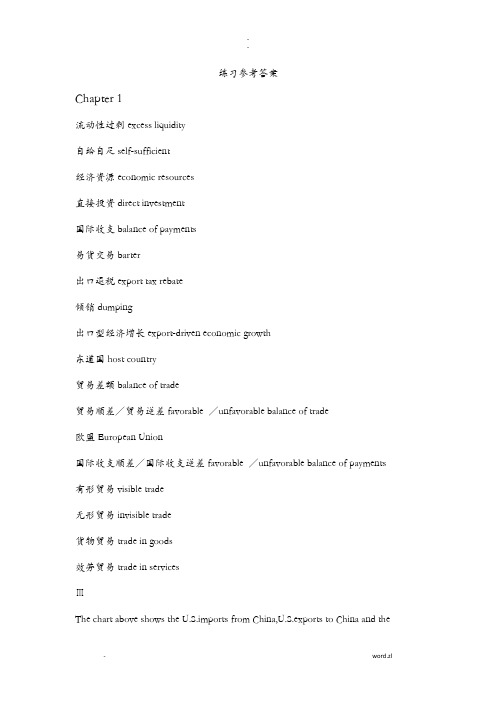
练习参考答案Chapter 1流动性过剩excess liquidity自给自足self-sufficient经济资源economic resources直接投资direct investment国际收支balance of payments易货交易barter出口退税export tax rebate倾销dumping出口型经济增长export-driven economic growth东道国host country贸易差额balance of trade贸易顺差/贸易逆差favorable /unfavorable balance of trade欧盟European Union国际收支顺差/国际收支逆差favorable /unfavorable balance of payments 有形贸易visible trade无形贸易invisible trade货物贸易trade in goods效劳贸易trade in servicesⅢThe chart above shows the U.S.imports from China,U.S.exports to China and thetrade balance.The U.S.has a negative trade balance with China,and it has been growing. During the period from 1997 to 2003,imports from China have grown 244%while exports toChina have grown 221%,indicating that the trade deficit is increasing.There had alreadybeen a sizeable trade balance deficit with China in 1996,totalling $39.5 billion at the end of theyear.Ⅳ1.Export goods are tangible goods sent out of countries.2.Trade in services are international earnings other than those derived from the exporting andimporting of tangible goods.3.Import goods are tangible goods brought in.4.International trade is all business transactions that involve two or more countries.5.FDI is one that gives the investor a controlling interest in a foreign pany.6.Investment is used primarily as financial means for a pany to earn more money on itsmoney with relative safety.Ⅴ1.International trade,is the fair and deliberate exchange of goods and /or services acrossnational boundaries.It concerns trade operations of both import and export and includesthe purchase and sale of both visible and invisible goods.2.In today’s plex economic world,neither individuals nor nations are self-sufficient. Nations participate in the international trade for many reasons.As to the economicreasons,no nation has all of the economic resouces 〔land,labor and capital〕that it needsto develop its economy and culture,and no country enjoys a particular itemsufficientenough to meet its needs.As for the preference reasons,international trade takes placebecause of innovation of style.Besides,every nation can specialize in a certain field andenjoy a parative advantage in some particular area in terms of trade so that they needto do business with each other to make use of resources more efficiently and effectively.3.In measuring the effectiveness of global trade,nations carefully follow two key indicators,namely,balance of trade and balance of payments.4.FDI,the abbreviation form Foreign Direct Investment,means buying of permanent property and business in foreign nations.It occurs when acquisition of equity interest in a foreign pany is made.The great significance of FDI for China might be that:FDIsolve the problem of capital shortage for China so that China may spend the money onimporting advanced equipment and technologies for its infrastructure,national supportingindustry,key projects,etc.Chapter 2关税壁垒tariff barriers非关税壁垒non-tariff barriers从量税specific duties配额quota保护性关税protective tariff市场失灵market failure幼稚产业infant industry许可证制度licensing system财政关税revenue tariff政府采购government procurement贸易保护主义trade protectionism从价税Ad valorem Duties最低限价floor price本地采购规那么“buy local〞rules增加需raise domestic demandDomestic content 国含量Red-tape barriers 进口环节壁垒Export susidies 出口补贴Binding quota 绑定配额Absolute quotas 绝对配额VER 自愿出口限制Tariff-rate quotas 关税配额Zero quota 零配额“Buy local〞rules 本地采购原那么Ⅱ1.Protectionism means the deliberate use or encouragement of restrictions on imports toenable relatively inefficient domestic producers to pete successfully with foreign producers.保护主义是指蓄意使用或鼓励进口限制,以此使本国相对效率低的产品能成功地和外国产品竞争。
英文版国际贸易实务2-7答案

国际贸易实务(英文版)International Trade Practice周瑞琪王小欧徐月芳编著Chapter twoIV。
Short questions1。
Who pays for loading for shipment under FOB?答:Seller.2. Who pays for unloading under CIF?答:Buyer。
3. Compare and contrast FOB, CFR and CIF?答:Similarities: a. Sel ler’s risk will be transferred to the buyer when the goods passthe ship’s rail. b. Seller is responsible for export customs formalities while buyer is responsible for import customs formalities。
c。
Buyer is responsible for unloading the goods at the port of destination。
d. All three terms can only be used for waterway transportation。
Differences: a. FOB requires the buyer to arrange and pay for the ocean transportation;CFR requires the seller to arrange and pay for the ocean transportation; CIF requires the seller to arrange and pay for the ocean transportation and insurance against the buyer's risk。
国际贸易实务英文版参考答案完整版
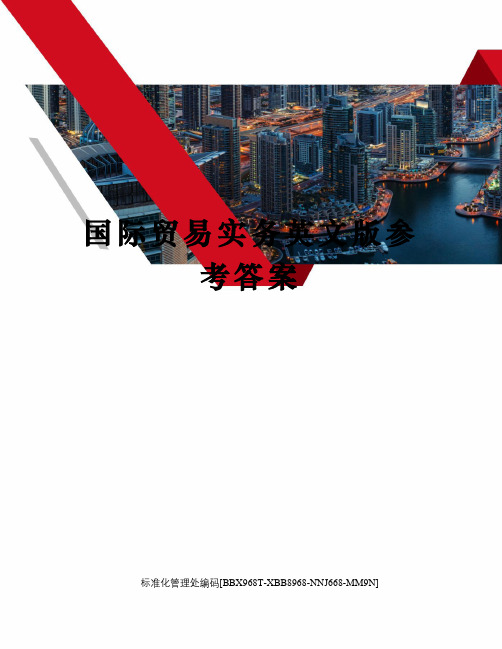
国际贸易实务英文版参考答案标准化管理处编码[BBX968T-XBB8968-NNJ668-MM9N]C h a p t e r1 I.YES,Pleaserefertothe1stparagraphofthetext.II.流动性过剩自给自足经济资源直接投资国际收支易货交易出口退税倾销出口型经济增长东道国贸易差额贸易顺差/贸易逆差欧盟国际收支顺差/国际收支逆差有形贸易无形贸易货物贸易服务贸易excessliquidityself-sufficient economicresourcesdirectinvestmentbalanceofpaymentsbarter exporttaxrebatedumpingexport-driveneconomicgrowthhostcountrybalanceoftradefavorable/unfavorablebalanceoftradeEuropeanUnionfavorable/unfavorablebalanceofpaymentsvisibletradeinvisibletradetradeingoodstr adeinservicesIIIThechartaboveshowstheU.S.importsfromChina,U.S.exportstoChinaandthetradebalance .TheU.S.hasanegativetradebalancewithChina,andithasbeengrowing.Duringtheperiodfrom1997to2003,importsfromChinahavegrown244%whileexportstoChinahavegrown221%,in dicatingthatthetradedeficitisincreasing.Therehadalreadybeenasizeabletradebalan cedeficitwithChinain1996,totaling$billionattheendoftheyear.IV1.Exportgoodsaretangiblegoodssentoutofcountries.2.Tradeinservicesareinternationalearningsotherthanthosederivedfromtheexporting andimportingoftangiblegoods.3.Importgoodsaretangiblegoodsbroughtin.4.Internationaltradeisallbusinesstransactionsthatinvolvetwoormorecountries.5.F DIisonethatgivestheinvestoracontrollinginterestinaforeigncompany.6.Investmentisusedprimarilyasfinancialmeansforacompanytoearnmoremoneyonitsmone ywithrelativesafety.V1.Internationaltradeisthefairanddeliberateexchangeofgoodsand/orservicesacrossn ationalboundaries.Itconcernstradeoperationsofbothimportandexportandincludesthe purchaseandsaleofbothvisibleandinvisiblegoods.2.Intoday'scomplexeconomicworld,neitherindividualsnornationsareself-sufficient.Nationsparticipateintheinternationaltradeformanyreasons.Astotheecon omicreasons,nonationhasalloftheeconomicresources(land,laborandcapital)thatitne edstodevelopitseconomyandculture,andnocountryenjoysaparticularitemsufficienten oughtomeetitsneeds.Asforthepreferencereasons,internationaltradetakesplacebecauseofinnovationofstyle.Besides,everynationcanspecializeinacertainfieldandenjoya comparativeadvantageinsomeparticularareaintermsoftradesothattheyneedtodobusine sswitheachothertomakeuseofresourcesmoreefficientlyandeffectively.3.Inmeasuringtheeffectivenessofglobaltrade,nationscarefullyfollowtwokeyindicat ors,namely,balanceoftradeandbalanceofpayments.4.FDI,theabbreviationformForeignDirectInvestment,meansbuyingofpermanentpropert yandbusinessinforeignnations.Itoccurswhenacquisitionofequityinterestinaforeign companyistrade.ThegreatsignificanceofFDIforChinamightbethat:FDIsolvetheproblem ofcapitalshortageforChinasothatChinamayspendthemoneyonimportingadvancedequipme ntandtechnologiesforitsinfrastructure,nationalsupportingindustry,keyprojects,e tc.Chapter2I关税壁垒非关税壁垒从量税配额保护性关税市场失灵幼稚产业许可证制度财政关税政府采购贸易保护主义从价税最低限价本地采购规则增加内需DomesticcontentRed-tapebarriersExportsubsidiesBindingquotaAbsolutequotasVER Tariff-ratequotasZeroquota"Buylocal"rulesTariffbarriersnon-tariffbarriersspecificdutiesquotaprotectivetariffmarketfailureinfantindustrylicensingsystemRevenuetariff governmentprocurementtradeprotectionismAdValoremDutiesfloorprice "buylocal"rulesraisedomesticdemand国内含量进口环节壁垒出口补贴绑定配额绝对配额自愿出口限制关税配额零配额本地采购原则II1.Protectionismmeansthedeliberateuseorencouragementofrestrictionsonimportstoen ablerelativelyinefficientdomesticproducerstocompetesuccessfullywithforeignprod ucers.保护主义是指蓄意使用或鼓励进口限制,以此使本国相对效率低的产品能成功地和外国产品竞争。
国际贸易实务英文版课后练习参考答案
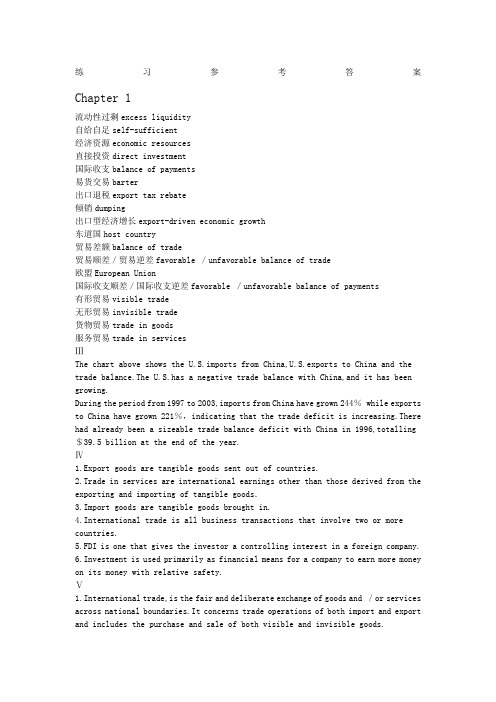
练习参考答案Chapter 1流动性过剩excess liquidity自给自足self-sufficient经济资源economic resources直接投资direct investment国际收支balance of payments易货交易barter出口退税export tax rebate倾销dumping出口型经济增长export-driven economic growth东道国host country贸易差额balance of trade贸易顺差/贸易逆差favorable /unfavorable balance of trade欧盟European Union国际收支顺差/国际收支逆差favorable /unfavorable balance of payments有形贸易visible trade无形贸易invisible trade货物贸易trade in goods服务贸易trade in servicesⅢThe chart above shows the U.S.imports from China,U.S.exports to China and the trade balance.The U.S.has a negative trade balance with China,and it has been growing.During the period from 1997 to 2003,imports from China have grown 244% while exports to China have grown 221%,indicating that the trade deficit is increasing.There had already been a sizeable trade balance deficit with China in 1996,totalling $39.5 billion at the end of the year.Ⅳ1.Export goods are tangible goods sent out of countries.2.Trade in services are international earnings other than those derived from the exporting and importing of tangible goods.3.Import goods are tangible goods brought in.4.International trade is all business transactions that involve two or more countries.5.FDI is one that gives the investor a controlling interest in a foreign company.6.Investment is used primarily as financial means for a company to earn more money on its money with relative safety.Ⅴ1.International trade,is the fair and deliberate exchange of goods and /or services across national boundaries.It concerns trade operations of both import and export and includes the purchase and sale of both visible and invisible goods.2.In today’s complex economic world,neither individuals nor nations areself-sufficient.Nations participate in the international trade for many reasons.As to the economic reasons,no nation has all of the economic resouces (land,labor and capital) that it needs to develop its economy and culture,and no country enjoys a particular item sufficient enough to meet its needs.As for the preference reasons,international trade takes place because of innovation of style.Besides,every nation can specialize in a certain field and enjoy a comparative advantage in some particular area in terms of trade so that they need to do business with each other to make use of resources more efficiently and effectively.3.In measuring the effectiveness of global trade,nations carefully follow two key indicators,namely,balance of trade and balance of payments.4.FDI,the abbreviation form Foreign Direct Investment,means buying of permanent property and business in foreign nations.It occurs when acquisition of equity interest in aforeign company is made.The great significance of FDI for China might be that: FDI solve the problem of capital shortage for China so that China may spend the money on importing advanced equipment and technologies for its infrastructure,national supporting industry,key projects,etc.Chapter 2关税壁垒tariff barriers非关税壁垒non-tariff barriers从量税specific duties配额quota保护性关税protective tariff市场失灵market failure幼稚产业infant industry许可证制度licensing system财政关税revenue tariff政府采购government procurement贸易保护主义trade protectionism从价税Ad valorem Duties最低限价floor price本地采购规则“buy local” rules增加内需raise domestic demandDomestic content 国内含量Red-tape barriers 进口环节壁垒Export susidies 出口补贴Binding quota 绑定配额Absolute quotas 绝对配额VER 自愿出口限制Tariff-rate quotas 关税配额Zero quota 零配额“Buy local” rules 本地采购原则Ⅱ1.Protectionism means the deliberate use or encouragement of restrictions on imports to enable relatively inefficient domestic producers to compete successfully with foreign producers.保护主义是指蓄意使用或鼓励进口限制,以此使本国相对效率低的产品能成功地和外国产品竞争。
最新国际贸易实务(周瑞琪等)-课后答案详解
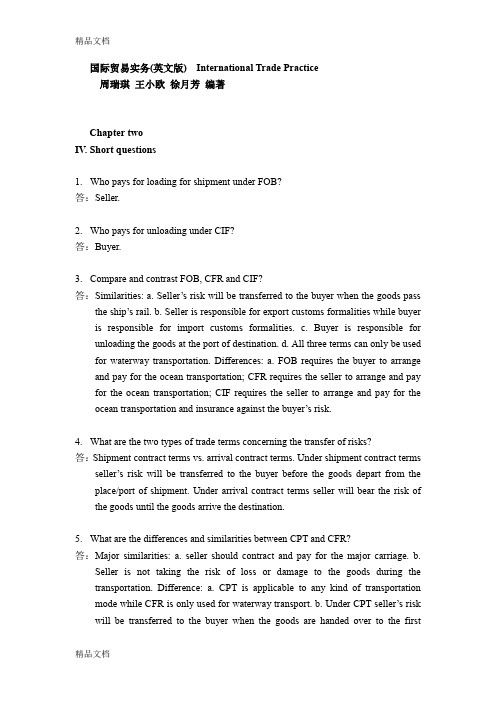
国际贸易实务(英文版) International Trade Practice周瑞琪王小欧徐月芳编著Chapter twoIV. Short questions1.Who pays for loading for shipment under FOB?答:Seller.2.Who pays for unloading under CIF?答:Buyer.pare and contrast FOB, CFR and CIF?答:Similarities: a. Sel ler’s risk will be transferred to the buyer when the goods pass the ship’s rail. b. Seller is responsible for export customs formalities while buyer is responsible for import customs formalities. c. Buyer is responsible for unloading the goods at the port of destination. d. All three terms can only be used for waterway transportation. Differences: a. FOB requires the buyer to arrange and pay for the ocean transportation; CFR requires the seller to arrange and pay for the ocean transportation; CIF requires the seller to arrange and pay for the ocean transportation and insurance against the buyer’s risk.4.What are the two types of trade terms concerning the transfer of risks?答:Shipment contract terms vs. arrival contract terms. Under shipment contract terms s eller’s risk will be transferred to the buyer before the goods depart from the place/port of shipment. Under arrival contract terms seller will bear the risk of the goods until the goods arrive the destination.5.What are the differences and similarities between CPT and CFR?答:Major similarities: a. seller should contract and pay for the major carriage. b.Seller is not taking the risk of loss or damage to the goods during the transportation. Difference: a. CPT is applicable to any kind of transportation mod e while CFR is only used for waterway transport. b. Under CPT seller’s risk will be transferred to the buyer when the goods are handed over to the firstcarrier nominated by seller. Under CFR seller’s risk will be transferred when the goods pass over the s hip’s rail.6.What are the differences and similarities between CIP and CIF?答:Major similarities: a. seller should contract and pay for the major carriage. b.Seller is not taking the risk of loss or damage to the goods during the transportation. c. Seller must obtain insurance against buyer’s risk. Difference: a.CPT is applicable to any kind of transportation mode while CFR is only used for waterway transport. b. Under CPT seller’s risk will be transferred to the buyer when the goods are handed over to the first carrier nominated by seller. Under CFR seller’s risk will be transferred when the goods pass over the ship’s rail.7.If you trade with an American, is the sales contract subject to Incoterms withoutany doubt? What should you do?答:No. The Revised American Foreign Trade Definitions 1941 is still in use, especially among the North American area. It has different interpretation about some trade terms. The traders should clarify the choice of rules before any further discussion.8.What are the most commonly used trade terms?答:FOB,CFR & CIF.9.Who is responsible for carrying out customs formalities for exports under an FOBcontract?答:Seller. According to Incoterms 2000, except EXW and DDP these two terms, all the other eleven terms require the seller to handle the export customs formalities, while buyer the import customs formalities.10.If a Chinese trader signs a FOB Hamburg contract, is he exporting or importing? 答:Importing. FOB should be used with a “named port of shipment”, if Hamburg is the port of shipment, from the Chinese trader’s perspective, he is importing.V.Case Studies1. An FOB contract stipulated, "The shipment will be effected in March 2008. If thevessel fails to arrive at the port of shipment on time, the seller agrees to set aside the goods for additional 27 days, and the buyer will bear all costs of delay." it turned out that under the seller's repeated requests, the vessel named by the buyer finally arrived at the port of shipment on May 1. As a result, the seller refused to make the shipment.(1)Was the seller entitled to compensation for the warehouse rent, insurance andinterest due to the delay?(2)If the seller had sold the goods to a third party on April 25, should the buyerpay for the delay?(3)If the seller had sold the goods to a third party on May 1 with a better price,was he entitled to any compensation?析:a案例中提到“shipment will be effected in March 2008”,这种确定装运时间的方式允许在整个3月份期间的任何时间进行装运。
国际贸易实务英文版课后练习答案

练习参考答案Chapter 1流动性过剩excess liquidity自给自足self-sufficient经济资源economic resources直接投资direct investment国际收支balance of payments易货交易barter出口退税export tax rebate倾销dumping出口型经济增长export-driven economic growth东道国host country贸易差额balance of trade贸易顺差/贸易逆差favorable /unfavorable balance of trade欧盟European Union国际收支顺差/国际收支逆差favorable /unfavorable balance of payments 有形贸易visible trade无形贸易invisible trade货物贸易trade in goods效劳贸易trade in servicesⅢThe chart above shows the U.S.imports from China,U.S.exports to China and thetrade balance.The U.S.has a negative trade balance with China,and it has been growing. During the period from 1997 to 2003,imports from China have grown 244%while exports toChina have grown 221%,indicating that the trade deficit is increasing.There had alreadybeen a sizeable trade balance deficit with China in 1996,totalling $39.5 billion at the end of theyear.Ⅳ1.Export goods are tangible goods sent out of countries.2.Trade in services are international earnings other than those derived from the exporting andimporting of tangible goods.3.Import goods are tangible goods brought in.4.International trade is all business transactions that involve two or more countries.5.FDI is one that gives the investor a controlling interest in a foreign pany.6.Investment is used primarily as financial means for a pany to earn more money on itsmoney with relative safety.Ⅴ1.International trade,is the fair and deliberate exchange of goods and /or services acrossnational boundaries.It concerns trade operations of both import and export and includesthe purchase and sale of both visible and invisible goods.2.In today’s plex economic world,neither individuals nor nations are self-sufficient. Nations participate in the international trade for many reasons.As to the economicreasons,no nation has all of the economic resouces 〔land,labor and capital〕that it needsto develop its economy and culture,and no country enjoys a particular itemsufficientenough to meet its needs.As for the preference reasons,international trade takes placebecause of innovation of style.Besides,every nation can specialize in a certain field andenjoy a parative advantage in some particular area in terms of trade so that they needto do business with each other to make use of resources more efficiently and effectively.3.In measuring the effectiveness of global trade,nations carefully follow two key indicators,namely,balance of trade and balance of payments.4.FDI,the abbreviation form Foreign Direct Investment,means buying of permanent property and business in foreign nations.It occurs when acquisition of equity interest in a foreign pany is made.The great significance of FDI for China might be that:FDIsolve the problem of capital shortage for China so that China may spend the money onimporting advanced equipment and technologies for its infrastructure,national supportingindustry,key projects,etc.Chapter 2关税壁垒tariff barriers非关税壁垒non-tariff barriers从量税specific duties配额quota保护性关税protective tariff市场失灵market failure幼稚产业infant industry许可证制度licensing system财政关税revenue tariff政府采购government procurement贸易保护主义trade protectionism从价税Ad valorem Duties最低限价floor price本地采购规那么“buy local〞rules增加需raise domestic demandDomestic content 国含量Red-tape barriers 进口环节壁垒Export susidies 出口补贴Binding quota 绑定配额Absolute quotas 绝对配额VER 自愿出口限制Tariff-rate quotas 关税配额Zero quota 零配额“Buy local〞rules 本地采购原那么Ⅱ1.Protectionism means the deliberate use or encouragement of restrictions on imports toenable relatively inefficient domestic producers to pete successfully with foreign producers.保护主义是指蓄意使用或鼓励进口限制,以此使本国相对效率低的产品能成功地和外国产品竞争。
- 1、下载文档前请自行甄别文档内容的完整性,平台不提供额外的编辑、内容补充、找答案等附加服务。
- 2、"仅部分预览"的文档,不可在线预览部分如存在完整性等问题,可反馈申请退款(可完整预览的文档不适用该条件!)。
- 3、如文档侵犯您的权益,请联系客服反馈,我们会尽快为您处理(人工客服工作时间:9:00-18:30)。
练习参考答案Chapter 1流动性过剩excess liquidity自给自足self-sufficient经济资源economic resources直接投资direct investment国际收支balance of payments易货交易barter出口退税export tax rebate倾销dumping出口型经济增长export-driven economic growth东道国host country贸易差额balance of trade贸易顺差/贸易逆差favorable /unfavorable balance of trade欧盟European Union国际收支顺差/国际收支逆差favorable /unfavorable balance of payments 有形贸易visible trade无形贸易invisible trade货物贸易trade in goods服务贸易trade in servicesⅢThe chart above shows the U.S.imports from China,U.S.exports to China and thetrade balance.The U.S.has a negative trade balance with China,and it has been growing.During the period from 1997 to 2003,imports from China have grown 244%while exports to China have grown 221%,indicating that the trade deficit is increasing.There had already been a sizeable trade balance deficit with China in 1996,totalling $39.5 billion at the end of the year.Ⅳ1.Export goods are tangible goods sent out of countries.2.Trade in services are international earnings other than those derived from the exporting and importing of tangible goods.3.Import goods are tangible goods brought in.4.International trade is all business transactions that involve two or more countries.5.FDI is one that gives the investor a controlling interest in a foreign company.6.Investment is used primarily as financial means for a company to earn more money on its money with relative safety.Ⅴ1.International trade,is the fair and deliberate exchange of goods and /or services across national boundaries.It concerns trade operations of both importand export and includes the purchase and sale of both visible and invisible goods.2.In today’s complex economic world,neither individuals nor nations areself-sufficient.Nations participate in the international trade for many reasons.As to the economic reasons,no nation has all of the economic resouces (land,labor and capital)that it needs to develop its economy and culture,and no country enjoys a particular item sufficient enough to meet its needs.As for the preference reasons,international trade takes place because of innovation ofstyle.Besides,every nation can specialize in a certain field and enjoy a comparative advantage in some particular area in terms of trade so that they need to do business with each other to make use of resources more efficiently and effectively.3.In measuring the effectiveness of global trade,nations carefully follow two key indicators,namely,balance of trade and balance of payments.4.FDI,the abbreviation form Foreign Direct Investment,means buying of permanentproperty and business in foreign nations.It occurs when acquisition of equity interest in aforeign company is made.The great significance of FDI for China might be that:FDI solve the problem of capital shortage for China so that China may spend themoney on importing advanced equipment and technologies for its infrastructure,national supporting industry,key projects,etc.Chapter 2关税壁垒tariff barriers非关税壁垒non-tariff barriers从量税specific duties配额quota保护性关税protective tariff市场失灵market failure幼稚产业infant industry许可证制度licensing system财政关税revenue tariff政府采购government procurement贸易保护主义trade protectionism从价税Ad valorem Duties最低限价floor price本地采购规则“buy local”rules增加需raise domestic demandDomestic content 国含量Red-tape barriers 进口环节壁垒Export susidies 出口补贴Binding quota 绑定配额Absolute quotas 绝对配额VER 自愿出口限制Tariff-rate quotas 关税配额Zero quota 零配额“Buy local”rules 本地采购原则Ⅱ1.Protectionism means the deliberate use or encouragement of restrictions on imports to enable relatively inefficient domestic producers to compete successfully with foreign producers.保护主义是指蓄意使用或鼓励进口限制,以此使本国相对效率低的产品能成功地和外国产品竞争。
2.If the Russians release their stocks of tin into the world market,the price of the metal will sink through the floor.一旦俄罗斯人将其持有的锡矿股票投放于国际市场之中,那么该市场中金属的价格会跌破最低限价。
3.Protective tariff means a duty or tax imposed on imported products for the purpose of making them more expensive in comparison to domestic producers,thereby giving the domestic products a price advantage.保护性关税表示对进口产品征收的关税,旨在让它们相比起本国商品更贵,从而使得本国商品具有价格优势。
4.Types of tariffs include ad valorem,specific,variable,or compound.In the UnitedStates,the imposition of tariffs is made on imported goods only.Tariffs raise the prices of imported goods,thus making them less competitive within the marketof the importing country.After seven” Rounds ”of General Agreement on Tariffs and Trade trade negotiations that focused heavily on tariffreductions,tariffs are less important measures of protection than they used to be. 关税的种类包括从价税,从量税,可变税与复合税。
